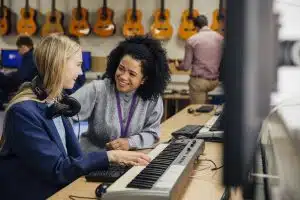Princeton Music Program
Princeton’s music program is a melting pot of cultures, fostering a rich learning environment for aspiring musicians. With a curriculum designed to nurture creativity and technical skills, students are prepared to make meaningful contributions to the music world. The program encourages the exploration of various musical genres, enabling students to find their unique sound and style.
Engage with the vibrant community at Princeton, and take the first step towards a fulfilling musical journey. Your talent, paired with the resources and guidance available, is the gateway to a harmonious future filled with endless possibilities.
A Glimpse into the Department of Music at Princeton
The Music Department at Princeton University stands as a paragon of musical excellence in the academic realm. Nestled within the historic walls of Princeton, this department is a melting pot of creativity, innovation, and tradition. But what truly sets the Princeton music program apart from others?
The Inclusivity of the Program
At its core, the Princeton music program is designed to be inclusive. While many might assume that it caters solely to those majoring in music, the reality is far from it. Princeton believes in the universality of music, its power to transcend boundaries, and its ability to resonate with every individual, irrespective of their primary field of study.
This ethos is evident in the way the department opens its doors to all Princeton students. Whether you’re a physics major with a penchant for classical symphonies or a literature enthusiast who dabbles in jazz, the department welcomes you with open arms.
A Multifaceted Curriculum
The curriculum at the Princeton music program is a harmonious blend of theory and practice. Students are introduced to the rich tapestry of music history, spanning from the Baroque era to contemporary times. They delve deep into music theory, understanding the intricacies of melodies, harmonies, and rhythms.
But it’s not just about textbooks and lectures. The program places a strong emphasis on practical application. Students are encouraged to pick up an instrument, join ensembles, and even compose their own pieces. Workshops with renowned musicians, masterclasses, and regular recitals provide students with ample opportunities to hone their skills.
Exploring Beyond the Traditional
While the Princeton music program pays homage to classical music, it is by no means restricted to it. The department recognizes the ever-evolving nature of music and ensures that its students are well-versed in contemporary trends. Courses in electronic music, sound engineering, and even music production are offered, allowing students to explore the vast realm of possibilities that the world of music presents.
Faculty: The Pillars of the Department
The success of the Princeton music program can be attributed in large part to its distinguished faculty. Comprising accomplished musicians, renowned composers, and esteemed musicologists, the faculty brings a wealth of knowledge and experience to the table. Their guidance ensures that students not only learn but also internalize, interpret, and innovate.
The Certificate Program: A Unique Offering
For those not majoring in music but still wanting a structured study, the Princeton music program offers a certificate program. This is akin to a minor, allowing students to delve deep into music while majoring in another subject. The certificate program is comprehensive, ensuring that students get a holistic understanding of music.
The Music Department at Princeton University is more than just a place of learning; it’s a community. A community where passion meets purpose, where tradition intertwines with innovation, and where every note played resonates with the legacy of the Princeton music program. For students looking to immerse themselves in the world of music, there truly is no better place.
Undergraduate Studies: Building a Solid Foundation
The Princeton music program, renowned for its excellence, offers an undergraduate curriculum that stands out in the world of music education. Let’s delve deeper into what makes this program a top choice for budding musicians and scholars.
The Core Philosophy
At the heart of the Princeton music program is a belief in a well-rounded education. Music, being both an art and a science, requires a deep understanding of its theoretical aspects while also nurturing the creative spirit. Princeton’s curriculum is crafted to ensure that students get the best of both worlds.
Meticulous Design and Structure
The undergraduate curriculum of the Princeton music program is not just a random assortment of courses. It’s a carefully structured journey that takes students from the basics to advanced topics. The program begins with foundational courses that introduce students to the world of music theory, history, and basic composition techniques.
As students progress, they delve deeper into specialized areas, allowing them to tailor their education based on their interests and career aspirations.
Criticism and Analysis
One of the standout features of the Princeton music program is its emphasis on criticism and analysis. Students are taught to approach music not just as performers but as critics. They learn to dissect compositions, understand the nuances of different musical forms, and appreciate the intricacies of rhythm, melody, and harmony. This analytical approach equips students with the skills to critique and appreciate music from various eras and genres.
The Art of Composition
While many music programs focus heavily on performance, Princeton gives equal importance to composition. Students are introduced to the art of creating music, from conceptualizing a piece to finalizing its structure. They get hands-on experience in composing for different instruments, ensembles, and even orchestras. Workshops with renowned composers and regular feedback sessions ensure that students get the guidance they need to hone their compositional skills.
Performance Opportunities
The Princeton music program believes in learning by doing. Throughout their undergraduate journey, students get numerous opportunities to perform, both solo and as part of ensembles. These performances, ranging from intimate recitals to grand concerts, provide students with the platform to showcase their skills and gain real-world experience.
Preparation for the Future
The ultimate goal of the Princeton music program is to prepare students for the future, be it advanced studies or a career in the music industry. The comprehensive curriculum, combined with performance opportunities and internships, ensures that students are well-equipped to face the challenges of the professional world. Whether they aspire to be performers, composers, musicologists, or educators, Princeton provides them with the foundation they need to succeed.
Diverse Opportunities with the Minor in Music
For those who have a passion for music but are majoring in another field, Princeton offers a Minor in Music. This program is a testament to the university’s commitment to providing a comprehensive music education. Students can explore various domains like electronic music, musicology, sound studies, jazz, and more. It’s a perfect blend of theory and practice, ensuring that students get a well-rounded experience.
Majoring in Music: A Deep Dive
Choosing to major in music at Princeton is a decision that comes with numerous benefits. Students get the chance to engage in independent work, be it in musicology or composition. The program emphasizes the intersection of creating, studying, and writing about music. It’s not just about learning; it’s about immersing oneself in the world of music.
The Evolution of the Princeton Music Program
Over the years, the Princeton music program has undergone significant transformations to stay at the forefront of music education. From introducing cutting-edge technology in music production to collaborating with international music institutions for exchange programs, Princeton has always been a step ahead.
The program’s evolution is a testament to its commitment to providing students with the best resources and opportunities. Historical archives show how the curriculum has adapted to the changing musical landscape, ensuring that students are always in tune with the latest trends and techniques.
Events and More: Staying Updated
The Princeton music program is a dynamic blend of rigorous academic studies and vibrant extracurricular activities. While the curriculum provides students with a solid foundation in music theory, history, and practice, the numerous events organized throughout the year offer them a platform to apply their knowledge, showcase their talents, and immerse themselves in diverse musical experiences.
Concerts and Recitals
One of the highlights of the Princeton music program is the series of concerts and recitals that take place regularly. These events feature performances by both students and faculty, spanning a wide range of musical genres from classical symphonies to contemporary compositions.
For students, these concerts are not just opportunities to perform but also to receive feedback from their peers, faculty, and sometimes even visiting artists. The experience of performing in front of an audience helps students build confidence, refine their skills, and understand the nuances of live performances.
Workshops and Masterclasses
The Princeton music program frequently hosts workshops and masterclasses conducted by renowned musicians and industry experts. These sessions provide students with a unique opportunity to learn from the best in the business.
Whether it’s a masterclass on advanced violin techniques or a workshop on music production, students gain insights that go beyond the regular curriculum. These interactions often lead to fruitful discussions, networking opportunities, and sometimes even collaborations.
Music Festivals and Competitions
Throughout the year, the Princeton music department organizes and participates in various music festivals and competitions. These events provide students with a platform to showcase their talents on a larger stage, compete with their peers from other institutions, and get recognized for their skills.
Participating in such events not only boosts students’ confidence but also adds significant value to their portfolios, making them stand out when applying for advanced studies or job opportunities in the music industry.
Collaborative Events
Collaboration is at the heart of the Princeton music program. Students often team up with their peers from other departments, such as dance, theater, or visual arts, to create interdisciplinary performances. These collaborative events allow students to explore the intersections of music with other art forms, leading to innovative and memorable performances.
Such experiences broaden students’ horizons and equip them with skills to work in diverse settings in the future.
Community Outreach Programs
The Princeton music program believes in giving back to the community. Students are encouraged to participate in outreach programs where they teach music to underprivileged children, perform at community centers, or organize charity concerts. These initiatives instill a sense of social responsibility in students and help them understand the power of music as a tool for change.
Staying Updated
With the ever-evolving world of music, staying updated is crucial. The Princeton music program ensures that students are always in tune with the latest trends, technologies, and techniques. Regular seminars, guest lectures, and industry visits are organized to keep students informed about the latest developments in the music world.
In conclusion, the Princeton music program offers a holistic experience to its students. It’s not just about attending classes and taking exams; it’s about living and breathing music every day. The plethora of events and activities ensures that students are always engaged, challenged, and inspired, making their time at Princeton truly transformative.
Interdisciplinary Approach of the Princeton Music Program
One of the standout features of the Princeton music program is its interdisciplinary approach. Students are encouraged to blend their musical studies with other academic disciplines. Whether it’s combining music with physics to explore the science of sound or merging it with psychology to understand the impact of music on human emotions, the possibilities are endless. This approach not only broadens the horizons for students but also prepares them for diverse career paths in the future.
Why Choose the Princeton Music Program?
The reasons for opting for the Princeton music program are numerous. Apart from the world-class faculty and state-of-the-art facilities, the program’s design ensures that students receive a comprehensive education. Whether you’re a budding musician or someone with a keen interest in musicology, Princeton has something for everyone.
Community Engagement and the Princeton Music Program
Community engagement is a cornerstone of the Princeton music program. Students are often involved in outreach programs, teaching music in local schools, or performing at community events. This not only helps in honing their skills but also instills a sense of social responsibility. By engaging with the community, students learn the importance of giving back and using their talents for the greater good.
Preparing for Admission
The Princeton music program is renowned for its excellence, making it one of the most sought-after music programs in the world. As such, gaining admission is a competitive endeavor. However, with the right approach, dedication, and guidance, aspiring students can significantly enhance their chances of being a part of this prestigious institution. Here’s a comprehensive guide to help you navigate the admission process and make your application stand out.
Understanding the Admission Criteria
Before diving into the preparation, it’s crucial to understand what the Princeton music program looks for in its applicants. While academic achievements play a significant role, the music department seeks a holistic profile. They are interested in students who not only excel academically but also demonstrate a deep passion for music, a commitment to their craft, and the potential to contribute to the university’s musical community.
Building a Strong Portfolio
- Performance Recordings: If you’re a performer, ensure you have high-quality recordings of your performances. Choose pieces that showcase your versatility and depth as a musician. It’s advisable to include both solo performances and ensemble pieces.
- Compositions: For those inclined towards composition, include original pieces that highlight your creativity and unique voice. Accompany your compositions with well-written scores and, if possible, recordings of the pieces being performed.
- Research Papers: If you have delved into musicology or ethnomusicology, include any research papers or projects you’ve undertaken. This demonstrates your academic commitment to music.
Gaining Practical Experience
The Princeton music program values students who have hands-on experience. Engage in extracurricular activities related to music:
- Ensembles and Bands: Join school or community bands, orchestras, or choirs. This not only hones your skills but also demonstrates teamwork and commitment.
- Music Workshops and Camps: Attend workshops, masterclasses, or summer camps. These experiences provide valuable learning opportunities and show your dedication to continuous improvement.
- Community Outreach: Volunteer to teach music in local schools or community centers. This reflects your passion for music and your desire to give back to the community.
Showcasing Commitment and Passion
While your portfolio and experiences speak volumes, your personal statement or essay is where you can truly shine. Narrate your musical journey, the challenges you’ve faced, and your aspirations. Highlight any mentors or experiences that have been pivotal in your musical journey. The Princeton music program seeks students who are not only talented but also deeply passionate and committed to their musical pursuits.
Academic Achievements
While the focus is on music, don’t neglect your academic achievements. A strong academic record indicates discipline, dedication, and the ability to juggle multiple responsibilities. Ensure you maintain good grades and participate in other school activities, showcasing a well-rounded personality.
Seek Recommendations
Letters of recommendation can significantly bolster your application. Seek recommendations from music teachers, ensemble directors, or anyone who has closely observed your musical journey. A strong recommendation can provide insights into your character, dedication, and potential, further strengthening your application.
Gaining admission to the Princeton music program is undoubtedly challenging, but with the right preparation and approach, it’s an achievable dream. Focus on building a comprehensive profile that showcases not just your talents but also your dedication, passion, and commitment to music. Remember, the Princeton music program is not just looking for musicians; they’re looking for future music leaders, educators, and innovators.
Global Exposure with the Princeton Music Program
In today’s globalized world, exposure to different cultures and music forms is crucial. The Princeton music program recognizes this and offers various programs for students to study abroad or collaborate with international artists. From attending workshops in Europe to performing in Asian music festivals, students get a taste of global music trends. This exposure not only enriches their knowledge but also provides a broader perspective, essential for any musician in the making.
Conclusion
In the world of music education, the Princeton music program stands out for its excellence and comprehensive approach. Whether you’re an aspiring musician or someone with a keen interest in studying music, Princeton offers the perfect platform to nurture your passion. With its diverse programs and opportunities, it’s the ideal place to embark on a musical journey.










































